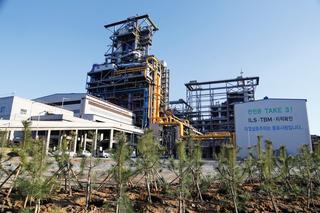China glut leaves Posco with first net loss, sinks others

SEOUL -- Steelmakers worldwide continue to struggle with low prices amid a flood of cheap Chinese products, with South Korean leader Posco falling into the red for the first time in 2015.
Posco suffered a net loss of 96 billion won ($79.4 million) on an 11% drop in sales to 58.1 trillion won as Chinese imports, which have doubled from a decade ago, choked demand. A strong dollar also led to foreign exchange losses. The company booked a 557 billion won net profit the year before. CEO Kwon Oh-joon said Thursday that Posco's troubles stem mostly from China's overproduction, which has resulted in an influx of extremely cheap steel.
But Chinese steelmakers aren't faring much better. Baosteel's Baoshan Iron & Steel is expected to see net profit plunge 83% in fiscal 2015 to 961 million yuan ($146 million). Other companies there likely fell into the red. Baoshan's chief laments that the steel industry has entered an earnings winter.
Chinese demand for steel dropped 3.5% in 2015 to 685 million tons, and it likely will dip another 2% this year, the World Steel Association said. The Asian giant reportedly has roughly 400 million tons of excess capacity. Businesses there slash prices to keep up production, and leftover products are exported at low prices.
Even those in the West are feeling the heat. United States Steel suffered a $999 million net loss in the October-December quarter. World leader ArcelorMittal took an operating loss in the July-September period at its European business. India's Tata Steel also fell into the red in Europe and said it would cut 1,050 jobs in the U.K.
Japanese makers focus mostly on high-quality steel used in cars and other products, so they have been less affected so far. But Nippon Steel & Sumitomo Metal still downgraded its forecast for a net profit increase for the fiscal year ending in March, now projecting a 16% drop. JFE Holdings and Kobe Steel also project a decline in sales and profit.
Chinese Premier Li Keqiang told the country's steel and coal industries this month to eliminate excess capacity like they were cutting off a limb. The State Council followed up with an announcement at the end of last week to slash production capacity of crude steel by 100 million to 150 million tons, just under 10% of the country's total.
China had tried several times to curb output, but regional governments were reluctant to shut plants and erode employment. This time, Beijing is offering financial support in exchange for closing redundant facilities, as well as unemployment assistance.
"We need to see how committed the Chinese government really is," an executive at a Japanese steelmaker said.
The long decline in steel prices stalled at the start of the year. There are even signs of an improved supply-demand balance, such as Baoshan announcing a price hike. But higher prices could easily boost production, taking down the industry once again.